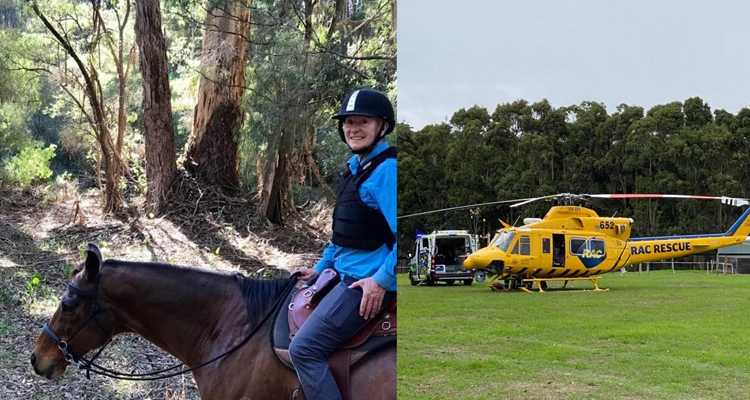From horseback to helicopter

When Witchcliffe local Julie Townsend set out on a peaceful horse ride on the Easter long weekend, she never expected to finish the day with an emergency flight on the RAC Rescue Helicopter.
It was early afternoon on a clear and sunny day and Julie, her partner Sue and good friend Kerry were enjoying a quiet and relaxing ride through the bush in Gracetown.
Julie was riding Happy, the 20-year-old racehorse she rescued almost 13 years ago.
As the trio approached the end of the trail, Happy, a characteristically calm horse, bucked unexpectedly and she was thrown to the ground.
Julie fell sideways and her shoulder took the brunt of the blow, fracturing six ribs and her scapula, or shoulder blade, one of the hardest and rarest bones to break.
The force of the impact also caused a spasm in the diaphragm muscle, making it difficult to breathe.
After a scrambling to find a patch of phone reception in the remote area, Sue immediately dialled 000, with St John Ambulance volunteers and a paramedic arriving on scene shortly after 2pm.
Meanwhile, because of the high-risk nature of Julie’s injuries, the RAC Rescue Helicopter was dispatched from its Bunbury base.
The helicopter landed close by, and first responders made quick work of getting her on board.
The RAC Rescue crew flew Julie to Bunbury Airport, where she was picked up by road ambulance and driven five minutes to Bunbury Hospital’s Emergency Department.
Julie recalls the 25-minute flight was smooth and quick compared to the usual hour-and-a-half journey by road.
“The helicopter crew were really professional and very reassuring,” she said.
“I can't adequately express my gratitude and thanks for this invaluable service and the professionalism of the paramedics and pilot who safely transported me.”
Julie spent around nine days in hospital, spending the second half of her stay closer to home in Margaret River Hospital.
Her injuries were notoriously painful fractures, with broken ribs impacting breathing, moving, eating and sleeping.
Significant force is required to break the scapula or shoulder blade, but when it does happen the injury is extremely painful and slow to heal.
Julie is now walking again and getting back to her active lifestyle, but her shoulder requires ongoing rehabilitation before she can get back in the saddle.
“Over the years I’ve always been an RAC member or the equivalent in other states but I never for a moment imagined that I would benefit from helicopter rescue,” she said.
“My sincere and heartfelt thanks to all concerned and to the RAC who truly do put their members first in providing not only this emergency service but roadside assistance.”
“I would have been in a lot of trouble without, so I’m very grateful.”
The RAC Rescue helicopters are sponsored by RAC, funded by the State Government and managed by the Department of Fire and Emergency Services (DFES).

